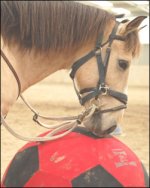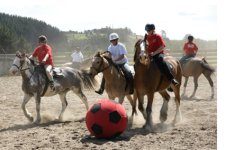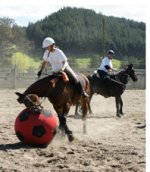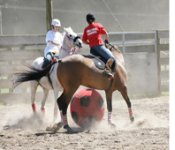You are using an out of date browser. It may not display this or other websites correctly.
You should upgrade or use an alternative browser.
You should upgrade or use an alternative browser.
اینم فوتبال اسب ها در نیوزلند Hoofball
- شروع کننده موضوع د.شهبازی
- تاریخ شروع
♘امیرحسین♞
♘ مدیریت انجمن اسب ایران ♞
پاسخ : اینم فوتبال اسب ها در نیوزلند Hoofball
مربوط به کدام کشور است؟
مربوط به کدام کشور است؟
reihaneh
Member
پاسخ : اینم فوتبال اسب ها در نیوزلند Hoofball
http://www.hobbyhorse.co.nz/index_files/page0008.html
http://www.horses.net.nz/index.asp?PageID=2145852351
Hoofball is a great training method to promote horse and rider working together using concentration and focus while having fun.
Once a basic foundation and communication are in place, Hoofball helps put principle to purpose, allowing horse and human to work as a team.
The main things to remember about Hoofball are:
BE SAFE! Don’t let competitiveness over-ride safety.
HAVE FUN! Don’t get too serious- laughter is your best friend.
Prepare For Your Game—What you need
-1
Large, durable ball such as 100cm design balls available through Sales Arena
-2
Field and Goal markers.
We suggest traffic cones which are soft and safe.
-3
Set-up the playing field. This can be an inside or outside arena or a level, safe pasture.
• Size depends on your need and availability; however a minimum of 25m by 60m is recommended.
• Arena is divided into two halves. Riders/mounts must not cross centre line.
• Ball must not cross boundary line.
• Goals are placed at each end; five meters in from boundary with goal mouth three meters wide.
• Goals can only be scored one way through goal posts but if a shot is missed and the attacking team retains possession they can bring the ball around for a second attempt
PLAYING THE GAME
PLAYERS.
• The number of horse/rider players is 4 per side, each side having two attacking and two defending players with unlimited subs. The attacking and defending players are restricted to the respective halves of the arena.
DURATION.
• Four ten minute quarters, with up to five minute break between quarters.
STARTING THE GAME.
• Ball is rolled in by the referee from the left or right boundary along the centre line.
UPON SCORING,
• The ball will be returned to the centre line by the referee.
RULES OF PLAYING HOOFBALL
• Two mounts only on the ball at any given time.
• Mounts can kick/push ball.
• Ball can be taken from a mount while in play.
• Riders can substituted or rotated at end of each quarter.
• Riders must not stay in same position for two consecutive quarters.
• Mounts can be shared at new quarter.
• Game continues until a goal is scored or the quarter is finished.
SAFETY WHILE PLAYING HOOFBALL
• Hard hats must be worn by riders while in play.
• Short whips only can be used and only on mount’s shoulder.
• Spurs can be worn (view identifying penalties).
• Bits must not have protrusions ie Tom Thumb bits.
• Bell boots and bandages may be worn.
• Riders can wear safety gear.
• Riders must take responsibility for their safety while playing.
• If a mount becomes unsafe (rider can not control) both must leave the playing ground and not be replaced until the quarter is finished.
• If a horse kicks another they are sin binned for the remainder of the quarter.
• Riders to be aware of the Referees location at all times.
IDENTIFYING PENALTY
• If spurs interfere with other rider/mounts a penalty will be incurred.
• If a bit interferes with other rider/mounts a penalty will be incurred.
• Excessive use of whip.
• Rider touching the ball in any way.
• Aggressive handling of mount by rider.
• Aggressive behaviour to another mount or rider (eg kicking, hitting, poking). Horse on horse contact is allowed but at referee’s discretion
• Defenders and attackers can not go out of their half of the grounds.
• Game played in walled arena– If horses and ball get jammed on fence for longer than 10 seconds the referee will call JAM and both riders must peel away from ball and wall allowing other team members to move ball away from the wall.
PENALTY
• Penalty given will be loss of the ball to the other team.
• Cross over centre line results in the other team being awarded ball at centre line on the side boundary.
• Cross over boundary line results in the other team being awarded ball at exit point on side boundary.
• A defensive penalty will result in the other team being awarded the ball at point of infringement.
• An offensive penalty will result in the other team being awarded the ball on the centre line in centre field.
REFEREE RESPONSIBLITIES
• Referee can be mounted or unmounted.
• Referee can be in any part of the playing grounds.
• Referees decision is the final decision.
• Referee will use a Whistle or Bell to identify a penalty, the start and the finish of a quarter.
• Referee can be time keeper and score recorder if extra help is not available.
Suggestions for a great game
• Ensure your horse has a good foundation of training before playing. Remember, you are putting principle to purpose which means you must have that principle intact first.
• Introduce and familiarize your horse with the ball BEFORE attempting to play the game. Do this first on the ground before mounted. Don’t force a scared horse which can result in injury.
• Make your focus more on the relationship with your horse rather than winning the game. Refrain from aggressive handling which will be grounds for dismissal.
• Remember, you are playing at your own risk. Equine activities are inherently dangerous in any form
منابع و اطلاعات بیشتر:Once a basic foundation and communication are in place, Hoofball helps put principle to purpose, allowing horse and human to work as a team.
The main things to remember about Hoofball are:
BE SAFE! Don’t let competitiveness over-ride safety.
HAVE FUN! Don’t get too serious- laughter is your best friend.
Prepare For Your Game—What you need
-1
Large, durable ball such as 100cm design balls available through Sales Arena
-2
Field and Goal markers.
We suggest traffic cones which are soft and safe.
-3
Set-up the playing field. This can be an inside or outside arena or a level, safe pasture.
• Size depends on your need and availability; however a minimum of 25m by 60m is recommended.
• Arena is divided into two halves. Riders/mounts must not cross centre line.
• Ball must not cross boundary line.
• Goals are placed at each end; five meters in from boundary with goal mouth three meters wide.
• Goals can only be scored one way through goal posts but if a shot is missed and the attacking team retains possession they can bring the ball around for a second attempt
PLAYING THE GAME
PLAYERS.
• The number of horse/rider players is 4 per side, each side having two attacking and two defending players with unlimited subs. The attacking and defending players are restricted to the respective halves of the arena.
DURATION.
• Four ten minute quarters, with up to five minute break between quarters.
STARTING THE GAME.
• Ball is rolled in by the referee from the left or right boundary along the centre line.
UPON SCORING,
• The ball will be returned to the centre line by the referee.
RULES OF PLAYING HOOFBALL
• Two mounts only on the ball at any given time.
• Mounts can kick/push ball.
• Ball can be taken from a mount while in play.
• Riders can substituted or rotated at end of each quarter.
• Riders must not stay in same position for two consecutive quarters.
• Mounts can be shared at new quarter.
• Game continues until a goal is scored or the quarter is finished.
SAFETY WHILE PLAYING HOOFBALL
• Hard hats must be worn by riders while in play.
• Short whips only can be used and only on mount’s shoulder.
• Spurs can be worn (view identifying penalties).
• Bits must not have protrusions ie Tom Thumb bits.
• Bell boots and bandages may be worn.
• Riders can wear safety gear.
• Riders must take responsibility for their safety while playing.
• If a mount becomes unsafe (rider can not control) both must leave the playing ground and not be replaced until the quarter is finished.
• If a horse kicks another they are sin binned for the remainder of the quarter.
• Riders to be aware of the Referees location at all times.
IDENTIFYING PENALTY
• If spurs interfere with other rider/mounts a penalty will be incurred.
• If a bit interferes with other rider/mounts a penalty will be incurred.
• Excessive use of whip.
• Rider touching the ball in any way.
• Aggressive handling of mount by rider.
• Aggressive behaviour to another mount or rider (eg kicking, hitting, poking). Horse on horse contact is allowed but at referee’s discretion
• Defenders and attackers can not go out of their half of the grounds.
• Game played in walled arena– If horses and ball get jammed on fence for longer than 10 seconds the referee will call JAM and both riders must peel away from ball and wall allowing other team members to move ball away from the wall.
PENALTY
• Penalty given will be loss of the ball to the other team.
• Cross over centre line results in the other team being awarded ball at centre line on the side boundary.
• Cross over boundary line results in the other team being awarded ball at exit point on side boundary.
• A defensive penalty will result in the other team being awarded the ball at point of infringement.
• An offensive penalty will result in the other team being awarded the ball on the centre line in centre field.
REFEREE RESPONSIBLITIES
• Referee can be mounted or unmounted.
• Referee can be in any part of the playing grounds.
• Referees decision is the final decision.
• Referee will use a Whistle or Bell to identify a penalty, the start and the finish of a quarter.
• Referee can be time keeper and score recorder if extra help is not available.
Suggestions for a great game
• Ensure your horse has a good foundation of training before playing. Remember, you are putting principle to purpose which means you must have that principle intact first.
• Introduce and familiarize your horse with the ball BEFORE attempting to play the game. Do this first on the ground before mounted. Don’t force a scared horse which can result in injury.
• Make your focus more on the relationship with your horse rather than winning the game. Refrain from aggressive handling which will be grounds for dismissal.
• Remember, you are playing at your own risk. Equine activities are inherently dangerous in any form
http://www.hobbyhorse.co.nz/index_files/page0008.html
http://www.horses.net.nz/index.asp?PageID=2145852351
♘امیرحسین♞
♘ مدیریت انجمن اسب ایران ♞
پاسخ : اینم فوتبال اسب ها در نیوزلند Hoofball
ممنون از توضیحت ریحانه + گرفتی
در همه مطالب اینطور باش!
ممنون از توضیحت ریحانه + گرفتی
در همه مطالب اینطور باش!




